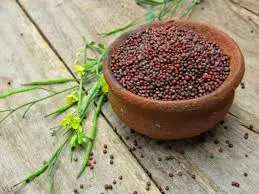Can Dogs Eat Mustard?A Comprehensive Guide
As pet owners, it’s crucial to remember that not all human foods are safe for dogs. Mustard, a popular condiment, is one such food that raises questions. So, can a dog eat mustard? In this article, we will explore the reasons why mustard is not suitable for dogs, its potential risks, and what alternatives you can offer to keep your pet happy and healthy.

Understanding Mustard: What Is It?
Mustard is a condiment made primarily from mustard seeds, vinegar, water, and various spices. It’s commonly used to enhance the flavor of foods like sandwiches, hot dogs, and salads. While mustard might add a zing to our meals, it can pose several risks for dogs. Let’s delve deeper into the ingredients of mustard to understand its impact on canine health.
Key Ingredients in Mustard
- Mustard Seeds: The primary ingredient, mustard seeds, are not toxic but can irritate a dog’s gastrointestinal system. Ingesting them may lead to nausea or digestive upset.
- Vinegar: Often included in mustard, vinegar is generally safe for dogs in small quantities. However, excessive amounts can cause stomach upset due to its acidity.
- Spices and Seasonings: Many mustard varieties include spices like garlic and onion powder, both of which are toxic to dogs. Even small amounts of these ingredients can lead to severe health issues.
- Sugar and Salt: Some types of mustard contain sugar and salt. Excessive sugar can contribute to obesity and dental issues in dogs, while high sodium levels can lead to salt poisoning.
Why Mustard Is Not Safe for Dogs
Feeding mustard to dogs is not advisable for several reasons:
1. Gastrointestinal Upset
Mustard can irritate your dog’s digestive system, leading to symptoms like vomiting, diarrhea, and abdominal pain. Dogs have different digestive needs than humans, and introducing strong flavors can upset their stomachs.
2. Toxic Ingredients
The presence of garlic and onion in many mustard varieties poses a significant risk to dogs. These ingredients can cause hemolytic anemia, leading to weakness, lethargy, and in severe cases, organ failure.
3. High Sodium Content
Many commercial mustard products are high in sodium, which can be harmful to dogs. High salt intake can cause increased thirst and urination, and in extreme cases, it may lead to sodium ion poisoning.
4. Unnecessary Calories
Mustard does not provide any nutritional benefits for dogs. It adds unnecessary calories to their diet, which can contribute to weight gain without offering any essential nutrients.
What to Do If Your Dog Eats Mustard
If your dog accidentally consumes mustard, it’s important to remain calm. While a small amount is unlikely to cause serious harm, keep an eye on your dog for any signs of distress. Symptoms to watch for include:
- Vomiting
- Diarrhea
- Lethargy
- Lack of appetite
- Abdominal discomfort
If your dog exhibits any of these symptoms or if you suspect they consumed a large quantity of mustard, contact your veterinarian for advice.
Safe Alternatives to Mustard for Dogs
If you’re looking to enhance your dog’s meals or provide a tasty treat, consider these safe alternatives to mustard:
1. Low-Sodium Broth
Low-sodium chicken or beef broth can add flavor to your dog’s food without harmful ingredients. Ensure that the broth does not contain onions or garlic.
2. Plain Yogurt
Unsweetened and unflavored yogurt is a great source of probiotics and can help support your dog’s digestive health. Just make sure to choose a variety without added sugars or flavors.
3. Pumpkin Puree
Canned pumpkin (not pumpkin pie filling) is rich in fiber and beneficial for digestion. Most dogs enjoy the taste, and it offers nutritional benefits without the risks associated with mustard.
4. Peanut Butter
Dogs often love peanut butter! Ensure you choose a variety that is free from added sugars, salt, and xylitol (a sweetener toxic to dogs). Peanut butter can be a fun treat or used in homemade dog biscuits.
5. Sweet Potatoes
Cooked and mashed sweet potatoes are another nutritious option that many dogs enjoy. They are rich in vitamins and generally well-tolerated by dogs.
Training Treats and Flavor Enhancers
If you want to reward your dog or make their meals more exciting, consider using healthy training treats or flavor enhancers. Many dog treats are designed to be both tasty and nutritious. Look for options that are low in calories and made with high-quality ingredients.
Conclusion: Can a Dog Eat Mustard?
In conclusion, mustard is not a safe condiment for dogs. While a tiny taste may not cause immediate harm, the potential risks—such as gastrointestinal upset, toxic ingredients, and high sodium content—far outweigh any benefits. Instead, opt for healthy, dog-friendly alternatives to enhance your pet’s meals and treats.
If you have any doubts about specific foods and their safety for your dog, consult your veterinarian. They can provide tailored advice based on your dog’s health and dietary needs. By prioritizing your dog’s health, you can ensure a happy and healthy life for your furry companion, free from the risks associated with mustard and other unsafe human foods. can a dog eat yogurt?
